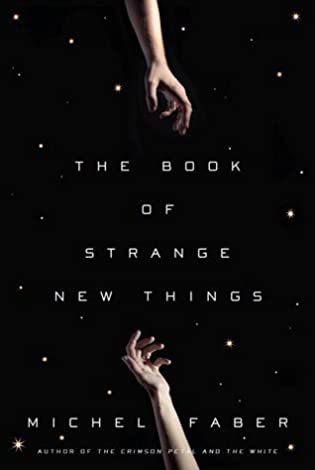The premise is a very curious one. Oasis is a planet that was essentially discovered by a private organisation, USIC, and fully controlled and operated by them. Like many other instances of colonialism in the world, this one is no different in that the newcomers introduce their religion. Originally introduced to Christianity as a likely method of control, a group of indigenous Oasans quickly take to Jesus, though their ability to grasp metaphorical speech means they believe everything told to them in the Book of Strange New Things, aka the Bible, is literal. They will literally live forever. Heaven is a literal place. Well, when the pastor they originally worked with mysteriously disappeared, the Oasans become distraught. They demand a replacement and refuse to supply the USIC humans with food.
Enter Peter, an English minister, that has been selected to administer ‘the good word.’ He sees this as an amazing opportunity to spread the name of Jesus to a whole new group of individuals that have never heard of Him. Leaving his wife behind, he flies off to space, afraid but hopeful. Peter is surprised and excited when he finds out that the locals have already accepted Jesus as their Lord and Savior and only want to continue learning about Him. For Peter, everything is perfect. Oasan world is the utopia he has always searched for. He becomes so wrapped up in the Oasans, that he slowly begins to forget that he is human. That he has a wife. That he has a life back on Earth. He wastes away until he is skin and bones. He gets severe sunburns, though never seems to realise this until a fellow USIC member admonishes him about it.
Meanwhile, Peter’s poor wife Bea is trapped on Earth, desperate to continue contact with her husband. She writes to him constantly through a contraption called “the Shoot,” a bit like intergalactic email. Her letters grow darker as the novel goes on, brimming with despair. The world is becoming a dangerous place. Large financial institutions are on the brink of collapse. Food becomes scarce. The government abandons its people. Natural disasters are occurring with alarming regularity. Atrocities against humanity committed frequently. Bea continually tries reaching out to Peter for help, for sympathy, guidance, love, understanding. She receives none of it. He begins avoiding her messages because they make him “feel bad” that he doesn’t care about the things she talks about. All he can see are the Oasans idolizing him for holding the word of Jesus.
For such a heavy book, it is surprising in that most of the action comes from Bea. Peter’s world is steady, full of neither excitement nor action. Faber tries to insinuate things have happened that are quite sinister, yet there is nothing uncovered after 500 pages. This book left me so angry, yet the ending seemed to fit the story well. I have so many conflicted feelings about this book, which made it so hard to come up with a rating. At times, this feels like a five star book. Other times, three stars seem adequate. I’m going to split the difference and give it four stars. This is a very uniquely written book that is so very interesting that it carries the reader to the end with minimal action. It will leave you full of emotion, whether it’s angry like I was/still am, or hopeful, and will keep you thinking about it for a good while after finishing. However, if you really dislike religion, steer clear. This book is, obviously, full of Christianity and Bible quotes.
Share this:
- Click to share on Facebook (Opens in new window) Facebook
- Click to share on X (Opens in new window) X
- More
- Click to share on Reddit (Opens in new window) Reddit
- Click to share on X (Opens in new window) X
- Click to share on Tumblr (Opens in new window) Tumblr
- Click to share on Pinterest (Opens in new window) Pinterest
- Click to share on Pocket (Opens in new window) Pocket
- Click to share on Telegram (Opens in new window) Telegram
- Click to share on WhatsApp (Opens in new window) WhatsApp
- Click to share on Mastodon (Opens in new window) Mastodon

 The Book of Strange New Things by
The Book of Strange New Things by 






